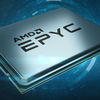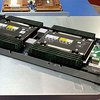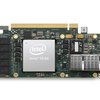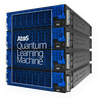After four years of development, the US Department of Energy (DOE) is releasing the Energy Exascale Earth System Model (E3SM), a computational platform for performing high-resolutions simulation of the weather and other earth systems.
Episode 220: Addison Snell and Michael Feldman analyze Cray's EPYC introduction and HPE's UK ARM move.
Fujitsu has performed a massive upgrade to RIKENs RAIDEN supercomputer using NVIDIA DGX-1 servers outfitted with the latest V100 Tesla GPUs.
The Jlich Supercomputing Centre (JSC) has installed the first module of JUWELS, a supercomputer that will succeed JUQEEN as the centers premier HPC system and pave the way for future exascale machines.
For the first time in five years, Cray will be offering supercomputers equipped with AMD chips. On Wednesday the company announced it has added support for EPYC 7000 processors in its CS500 product line.
A trio of UK universities will install a set of HPE Apollo 70 clusters powered by Caviums ThunderX2 ARM processors. The effort is part of a three-year project, known as Catalyst UK, which is evaluating the potential of ARM-based supercomputing.
Episode 219: Addison Snell and Michael Feldman analyze the DOEs newly-announced RFP for U.S. Exascale projects.
Intel announced Fujitsu and Dell EMC will offer servers with Intels Arria 10 GX field programmable gate array (FPGA) accelerators, along with a supporting software stack.
SenseTime, a Chinese-based artificial intelligence company, has raised $600 million in series C funding, bringing its valuation to over $4.5 billion according to investors tracking the startup.
Scientists at the Atos Quantum Laboratory say they have incorporated quantum noise into the workings of Quantum Learning Machine (QLM) platform the company offers to researchers.








